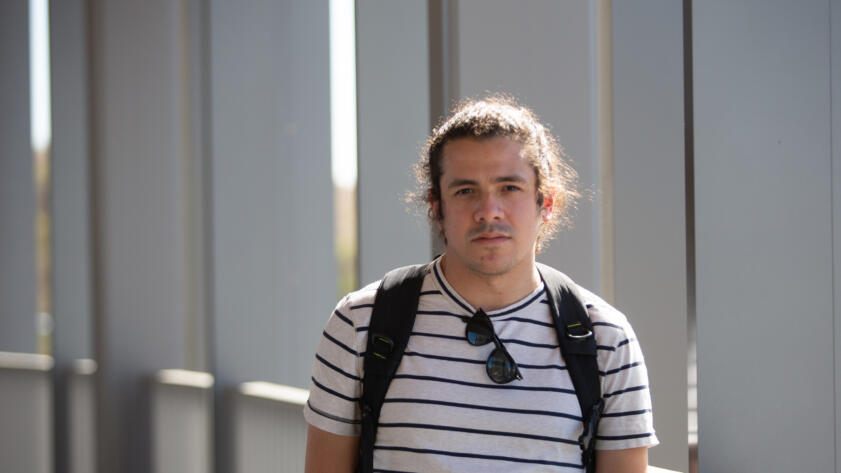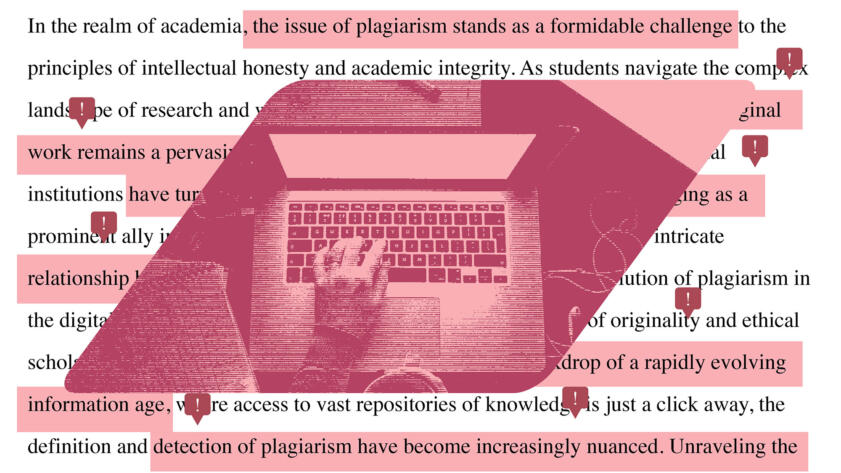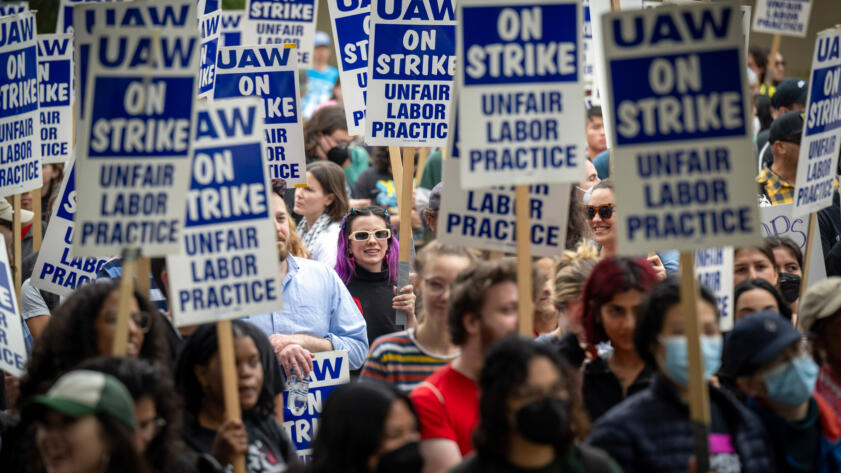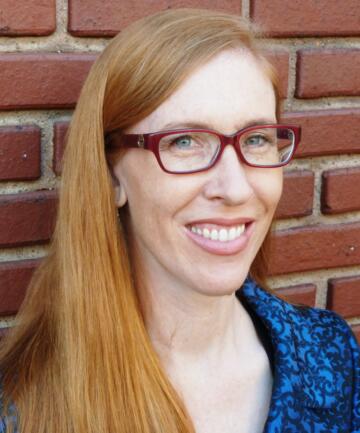Hi, I’m Mo Al Elew, and I’m a journalism engineer here at The Markup.
As protests against the war in Gaza have spread across college campuses in the U.S. over the last several months, they’ve renewed debates over academic freedom and freedom of speech.
Nowhere is this more evident than in the massive University of California system. The UC Board of Regents is currently deliberating a rule change that includes prohibiting the publication of “discretionary statements” on academic departments’ web homepage. Such statements are unrelated to a department’s daily activities, and often take a stance on current events. As one example, the regents cited statements issued by UC San Diego’s Ethnic Studies department. The department’s web page includes statements on affordable student housing, racist graffiti on campus, caste-based discrimination, Israel-Palestine, and most recently a press release calling for the resignation of the university chancellor.
Some faculty in the UC system have criticized the proposed rule change for its potential to violate academic freedom, while supporters claim it will avoid faculty opinions being misinterpreted as the views of the university system as a whole. A letter signed last month by over 500 UC faculty members said that faculty criticism of the policy is disingenuous, because anti-Zionist activism by some departments denies the academic freedom of Jewish students and faculty. A vote on the proposed policy has been postponed several times, and rancor over the topic shows no signs of slowing.
I discussed the conflicting invocations of academic freedom, campus free speech, and the role of higher education with Julia Schleck, the University of Nebraska Lincoln’s Associate Professor and Vice Chair at the English Department. She oversaw one of the nation’s most high profile “campus free speech” crises of the last decade. In 2017, a graduate student’s standoff with an undergraduate student who was publicly promoting a conservative nonprofit led to a monthslong conflict including university administrators, faculty, and state senators over academic freedom and freedom of speech. Schleck’s book Dirty Knowledge, published in 2022, reflects deeply on those events and offers a new vision for higher education in the 21st century.
Mo Al Elew: How did you come to write a book about academic freedom and higher education?
Julia Schleck: I did my PhD at NYU, and I was involved in organizing the graduate student union, so I came into this position knowing that university labor politics would be something of interest to me. Even though UNL does not have a faculty union, we have an AAUP (American Association of University Professors) chapter that I helped reinvigorate. We had an active membership in 2017 when a [student] tabling for [the conservative nonprofit] Turning Point USA recorded a grad student protesting her table. The recording and images became a national story.
So as president of the AAUP chapter and the grad chair of the english dept, I played multiple roles in one of the major free speech controversies. The fall out of that lasted all year resulting in a major Chronicle of Higher Education story and an episode of This American Life and lead to many other ramifications including the censuring of UNL by AAUP. This meant that I spent pretty much all of the time I would have spent on research on this.
It linked very much to my concerns about academic labor. Since the grad student [lecturer] was on contract, they could simply not be rehired the upcoming year while they were castigated publicly as someone who could never be hired by UNL again … even though she was an excellent teacher. Basically she ended up being fired for her political protest and not for her ability as a teacher or research.
One thing I noticed immediately [upon beginning book research] was there was a great deal written about academic freedom and a great deal written about academic labor, but that connection was not being put together about what was going on in academic spaces.

Machine Learning
He Wanted Privacy. His College Gave Him None
A Markup examination of a typical college shows how students are subject to a vast and growing array of watchful tech, including homework trackers, test-taking software, and even license plate readers
Al Elew: But I don’t know if the news reporting on the 2017 case made a clear distinction between freedom of speech and academic freedom. Could you explain the difference between them?
Schleck: Yeah, this is really important and it is not made clear often.
There’s a few clear differences between the two. First of all, the first amendment protects you from government persecution for your speech. It is very much enshrined in law. It has no protection from your employer. You can say what you want and the government will not throw you in jail. But your employer might fire you. Free speech rights are only protections from government and are an individual right. So they belong to anyone with a claim to civil rights in the United States.
Academic freedom is a collective right extended to faculty working at an institution of higher education. It is designed as a labor protection in order to allow for the freest possible generation and dissemination of knowledge. It has a specific purpose and it is not enshrined into U.S. law. It is protected primarily through employment conditions.
It is there in order to ensure you are free to teach to the best of your professional ability, publish research without being concerned that if any of that work upsets somebody whether it is a politician, administrator, donor, church, whoever it upsets that you won’t get fired. [This interest comes from the idea that] we as a society are invested in the free production of knowledge.
Al Elew: Over 500 University of California faculty sent a letter to the Board of Regents arguing over competing claims toward academic freedom. One of the debates is about a proposed change to statements published on department websites. I am curious about your opinion on whether this debate at the UC is related to academic speech? And what was UNL’s policy response in 2017-18? Did those changes hurt or improve academic freedom?
Schleck: UNL passed two policies: one policy on where and how speech can happen and another adjusting school bylaws.
The former sets up particular areas on campus where public protest and other speech can and should happen. It’s a reasonable usage guideline. And to some degree there are reasonable expectations about university operations, for example [not] setting up a day long screaming match inside a library. There are ways in which normal university operations—education and research—should continue uninterrupted.
Regarding units putting out statements, it is important that academic freedom is a collective faculty right. So for example, if I’m assigned to teach a Shakespeare class and I spend the entire class not talking about Shakespeare, or I teach it in a way so far beyond the norms of my field, my colleagues would have a right to say you can’t teach this class that way. This is not representing our discipline, and that’s the limits of academic freedom as a collective right.
You have a responsibility towards the collective. That also means that we collectively have the authority to say “this is where our field is right now,” and field knowledge is never completely apolitical. Part of the point of Dirty Knowledge is that knowledge production always has a politics. So it is entirely within the rights of a faculty or a department to indicate “this is what our field norms are—our faculty agrees this is where our knowledge places our field on a particular issue.” For example, a Judaic Studies department saying “our field is solidly pro-Zionist” and “entirely in support of Israeli policy.” That is something they would have the right to do as a faculty and that is part of their academic freedom.
As you said, we have a responsibility as educators to provide a space where all our students can learn comfortably and that requires us to think through “are there ways in which we are making it difficult for our students to learn” and part of that is anxiety or exclusion. This is where questions around what can be classified as hate speech, racism, sexism are all worth thinking about. Just because you have a right to say something and speech laws and academic freedom give you the right to argue with, educators have a responsibility as teachers have to ask “how can we find a way to fairly and honestly represent the knowledge generated in our teaching and statements that also maintains community.” That is not about rights—it’s about being an effective educator.
Al Elew: That reminds of an essay I read about professor-student romantic relationships. The author’s thesis was essentially that although a relationship is usually not in violation of university regulations, the professor cannot effectively do their job when dating a student. Can you expand on being an effective educator and academic freedom?

Hello World
Face Scanning and the Freedom to "Be Stupid In Public": A Conversation with Kashmir Hill
The longtime privacy journalist on how investigating Clearview AI helped her appreciate facial recognition—and envision a chaotic future
Schleck: That connects with creating an educational community within higher education. Is this all about exercising the rights we have? Or is it also about finding ways to create and share work in discussion spaces that enables us all to create our best work.
That does not mean avoiding difficult or upsetting topics but finding ways to manage them such that the community is strengthened by it rather than damaged.
That is certainly the case with professors having relationships with their students. You are in a situation where the student is not free to break up with you. That’s where the power dynamic comes into play and why it is problematic. Where your research and livelihood are in play—so in many places policies are in place now concerning professor student relationships.
There’s also good reasons to think about this when you’re in faculty and there are very strong political opinions backed up by field knowledge related to current events. How do you teach that to a class with students who are forming their own opinions for the first time, who may come from a different place regarding the current event, so how do you find a way to help them learn and be persuasive and represent what you feel is right in terms of the positions of the field’s knowledge and be able to break down the thought process?
Versus simply: “I disagree with the student politically,” so finding a way to keep conscious of the power dynamic. That’s our responsibility to both be good educators and good peers in classroom spaces and pull together to find ways that we all can learn.
Al Elew: In the book, you write that unions are necessary but inadequate especially if they don’t put forward a new vision of higher education. Have recent actions by the graduate student union at the University of California changed your analysis of the union’s role? Academic workers have gone on strike alleging the violation of workplace free speech policy demanding all university sanctions and criminal charges be dropped.
Schleck: I should make clear that I do say that unions are necessary but insufficient, but I want to lean on the “necessary” part. Moments like that actually show what unions can do in an era where 75% of faculty are off the tenure track.
Campus administrators seem to increasingly be empowered to act as unhindered executives and simply rule by fiat as long as they feel it is in their interest to do so. And unions are one of the only formations on campus that have a very powerful countervoice for that and tools to protest it. And seems to be frequently one of the only tools because academic workers are far more vulnerable today. It gives faculty the ability to speak out in protest on campus.
Academic freedom was originally put in place in part because, say you are a faculty member teaching very controversial matters that frustrate the administration, university board, wealthy donors, etc. You go ahead attend protest in line with the kind of research you do and the response is “well, this brought disrepute on the faculty and therefore we are going to fire you” where in actuality it is your research and teaching that they object to and the fact is that they could get around the academic freedom violation charge and say “well this related to that protest.”
So that is how academic freedom gets into this gray area with your freedom of speech and can create a backdoor mechanism for firing someone for something that is actually their academic work for things protected by their government free speech.
Al Elew: Your book acknowledges the university is full of competing interests—students, wealthy donors, foundations, professors, politicians, government agencies, etc. How do we get to a broad understanding of a dirty university where these interests are if not accepted then acknowledged as a part of university operations while maintaining trust in higher education?
One solution referenced in the book are general research funds. That was one solution to fund a diversity of research not directly connected to the various competing interests.
Schleck: Philanthropic donations have always been a part of American universities, and academic freedom is partly to protect faculty research and teaching from undue philanthropic influence.
Norms of academic freedom were invented in the early 20th century, and one of the earliest cases is a faculty member at Wharton school who was fired by [Joseph] Wharton, because Wharton is of course a business owner and the faculty member was advocating against child labor or in favor of child labor laws through his research into working conditions at textile factories.
That was one instance in which it was clear the founder of the school had opinions on societal measures and their funds, so at the time his interests helped to get the professor fired. That is one of a number of cases of the era. And that change came because universities take an immense amount of money to run, so you can say at the moment individual donors, business interests are on the rise and the state is backing away.
So yes it is critical to have a general fund and a fund for fields that are contrarian that have a critique of the status quo that are seen as economically pointless in the neoliberal trend. Deliberately seeking to fund fields of study that go against the prevailing trend.
I think it is worth keeping in mind how full of conflict the university has always been. There are rivalries that have been legendary even within departments that have faculty that hate each other, because they have embraced different understandings of their discipline and for them it is super potent. They have argued against each other to the death.
Different fields have arguably similar conflicts— the atmospheric sciences at points had people working on fossil fuel extraction and people working on climate change, but in the same department. Are there ways in which the university naturally houses all kinds of competing ideas and politics? That is to some degree among its roles. If one side is systematically silenced or another systematically eliminated, then that’s a problem.
And that’s not to say, well there’s nothing to be done about that. It is something that we [acknowledge] … “We are dirty too, we have politics too” and if we agree with that then we want to limit the donor’s ability to specify where their donations go. “If you want to give to our university, then give to our university. Period.”
We will decide where it will be allocated and that is one thing to do or all donations are open under sunshine laws to keep dirty money or quiet money from secretly influencing the direction of research and teaching. It will also highlight what is not getting funded and finding ways to instead suggest this other thing get funded.
Al Elew: I really connected with your idea of the university as a seedbank. Where did that idea come from and what are some examples?
Schleck: I think the point about it being a long term battle, always a long term antagonistic political battle fought in these long form sublimated ways through ways of knowing the world that made a lot of sense to me. Also especially as someone who studies old things. It forced me to also say who cares about all that old stuff from long ago or the fields that have no function economically, since we are all being asked to justify our existence economically in the university.

Machine Learning
Plagiarism Detection Tools Offer a False Sense of Accuracy
The tools that likely brought down Harvard president Claudine Gay are improperly used on students all the time
For example, if you are taking [musical] instrument instruction, how does a one on one lesson for classes that are necessarily small ever work out economically. And so how do you justify the continued support because it does take money to do this work.
How do we justify to people who fairly ask when they are cash strapped, why should my tax dollars go to this?
I wanted to take that question seriously. If you have someone who may or may not have gone to college, how do you justify it to them? The phrase the common good gets thrown around a lot. But how do you define that? What the university produces is good for someone but not for everybody. And so if that’s the case then, what we are all fighting over is the common good and whether the university’s role will produce something meeting that or not.
And of all the answers, for me the point is about potential. Yeah we may not need this right now. Right now, we may find it pointless, wrong, expensive, lacking monetary value—all those things and we can’t know when that might change. And there have been so many times—I have several examples in the book. For example, we are all suddenly fascinated by past plagues unlike when we had no reason to be prior to this. And yet suddenly it is urgently interesting: “How do they end? What happens to populations? What happens to economies? Histories on the Spanish flu.”
In the 1950s, for example, there was a very concerted effort and deliberate high profile effort to wipe out leftist speech, knowledge production, philosophy from the university as well as from the entertainment industry all the way up to high profile places. That wipes out a whole link in the chain of our knowledge and in that area of human politics.
But it is there for others to pick back up, for example there has been a resurgence in that kind of knowledge production via the Bernie Sanders campaign, some alternative media—producing greater interest. And so there are many examples: scientific, medical, political traditions for example interest in union histories.
Al Elew: What should people do? Is there a different role for students in bringing forward a university as a seed bank?
Schleck: Yes, students as students [and not customers]. But also we should push back against the idea that students bear the load of funding the college. That one thing is driving an immense amount of the change on college campuses.
The idea that having access to higher education is entirely dependent on one’s ability to take on huge loans or be independently wealthy or have wealthy parents—that further restricts who gets to attend college. And it also means that decisions at the university get driven by who is paying tuition dollars.
Changing that would help students themselves while in college and beyond, but also it helps restructure the interests of the college. It would also allow for a greater freedom in what students study. They can study something deemed wholly useless, weird, worthwhile and out there, because they do not have to stop and ask “how is this going to allow me to pay off $50,000” in the next few years. That’s a huge pressure and it puts a lot of constraints on choices on what you are able to study.
Insofar that we should all be fighting to say the university provides a societal value rather than an individual product that you can purchase, then that changes the ballgame. And from there we should pay attention to what good we are providing society as a whole.





